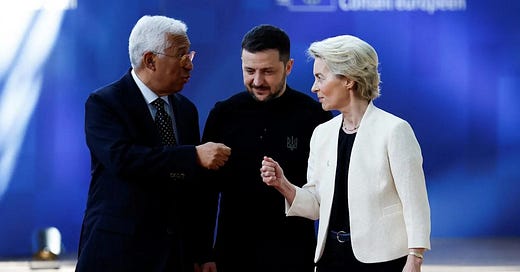It’s time to put an end to the U.S. as the “world’s police”
Many Americans, especially those who oppose Trump, are moving abroad and many are landing here in Spain. As an American who has been lucky enough to live here since 1998, I know first-hand how you can never leave your American-ness behind. One’s status as a foreigner is always on display no matter how well you’ve adapted, so it is very often the focus of conversation. You become the de facto U.S. spokesperson, receiving praise and criticism alike. The most common complaint I’ve heard over the years is that the U.S. has no business being the “police” of the world.
I agree. And I also believe in the post-WWII liberal world order that the U.S. constructed alongside Europe. It has brought a period of relative peace and prosperity that we can all do well to take a moment to appreciate. It’s been no small accomplishment in a world where transnational cooperation is often just wishful thinking.
It’s beyond belief that Trump thinks that the liberal world order has somehow been a drag on the U.S., much like he thinks that “the E.U. was formed to screw the U.S.” The liberal world order has always served U.S. interests first and foremost so it’s mindboggling Trump wants to take a wrecking ball to it.
But here’s where Trump isn’t totally wrong: it’s been 80 years since end of WWII and the U.S. is still the “police” of the world, most notably, still defending Europe. Sure, in the early years this was done in the name of U.S. interest. But as time has marched on, many Americans—from both the right and the left—scratch their heads and ask: why on earth is the U.S. spending money to defend a wealthy region of the world? These countries Americans fantasize about visiting and envy for their universal healthcare and high-speed trains.
Here in Europe, the big question is: why on earth have European leaders given so much power to the U.S. by allowing it to continue in this role? This inaction has led to the turmoil this week as the world watched Trump treat Zelenskyy like a mob-boss in the Oval Office. It was horrifying and European leaders seemed to finally grasp the seriousness of Trump’s calls for it to step up its own defense
I asked my colleague, Michele Testoni, International Relations professor at IE University and he assured me that “the issue of burden sharing with NATO is as old as NATO itself.” Indeed, every U.S. president, going all the way back to Dwight Eisenhower, have urged burden sharing on defense via NATO. As early as 1953, just four years after NATO was founded, Eisenhower warned European allies that “the American well can run dry.” This call didn’t just come from the “hawkish” Republicans like Nixon, Reagan and Bush I and II, but also “friendlier” Democrats, Kennedy, Carter and Clinton. Obama, beloved by European leaders, pleaded with them to make progress towards the 2024 spending goal that was set in 2014. But they were more interested in photo opportunities with him.
Obama himself had already provided them with a wake-up call to focus on defense when he announced the “pivot to Asia” foreign policy focus in 2011. This made perfect sense given the economic and security challenges in the region. Many Europeans questioned the continuing commitment of the U.S. to the transatlantic relationship and NATO, yet this didn’t incite any big move towards more defense spending.
During Trump’s first term I wrote that a positive thing that could come out of his presidency could be a Europe that is more unified around security and defense. This was in 2017, when Trump had said that he might not support NATO’s Article 5. Eight years ago, this was an unthinkable thing for a U.S. president to say and something that deeply threatened European security. Again, there was lots of pearl clutching over it but little action.
So now here we are, in a crisis that was forewarned. Why haven’t EU leaders done their job to assure the defense of the region? Testoni reminded me that “military spending is culturally very unpopular.” The most typical narrative around the lack of defense spending is that European voters don’t like it. They would rather have their taxes spent on social programs such as education and health. There’s also WWII in the rear-view mirror and, until the war broke out in Ukraine, a feeling that there weren’t so many threats. Finally, EU coordination is critical yet much easier said than done since member states have differing defense priorities and there are also EU fiscal restraints.
It’s difficult, but if democratic countries and institutions can’t get the difficult work done, then this just gives those who prefer authoritarianism a pretty good anti-democracy argument.
So, how do you want it? For the U.S. to continue as the “police” of the world or an independently secure Europe? As we move forward, it will be important to recognize that military spending is often more about deterrence than marching off to war. Also, it needs to go hand in hand with building up local defense industries so the money can be spent right here in Spain and Europe. Most importantly, it’s about having a Europe that is free from the whims of U.S. voters and leaders.
This is the English version of my column, La Globalista, in El Español.





